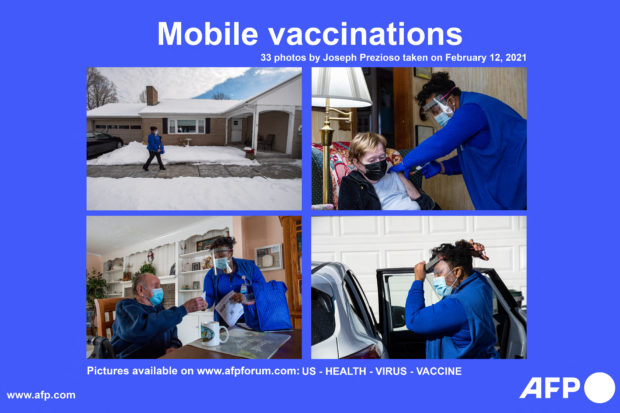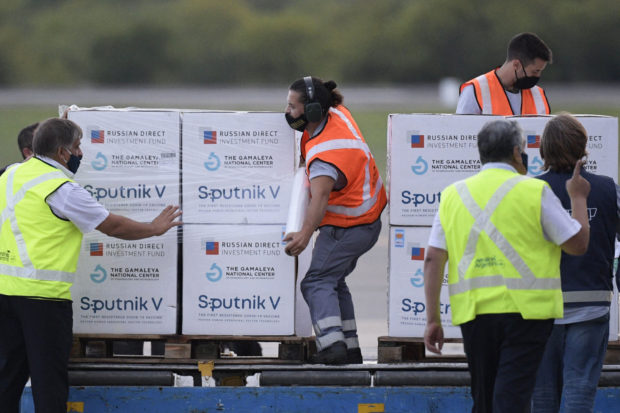No end to pandemic without equal vaccine access, experts warn

AFP presents a photo essay by Joseph Prezioso on mobile Covid-19 vaccinations done by R.N Natalie O’Connor visiting patients at their homes in Manchester and Bloomfield, Connecticut on February 12, 2021. – Mobile vaccinations are being done by nurses visiting patients who are home bound or can’t reach a Covid-19 vaccine site due to health or mobility reasons. Hartford HealthCare at Home is trying to vaccinate 3,355 patients with a team of almost 90 nurses. Nurses are sent out with pre-loaded Covid-19 vaccine doses and have a few hours to get to as many homes as they can before the vaccine spoils in the car. Doses are good for six hours once in the syringe. (Photo by Joseph Prezioso / AFP)
PARIS France – Developing new Covid-19 vaccines will fail to end the pandemic unless all countries receive doses in a fast and fair manner, disease experts warned Saturday.
As several nations consider implementing vaccine passports when international travel resumes, the authors of an open letter published in the Lancet medical journal said vaccine stockpiling in wealthier countries would only prolong the global health emergency.
They warned that “vaccine nationalism” could leave the Covax initiative aimed at getting vaccines to low- and middle-income countries facing a huge dosage shortfall for several years to come.
“The stark reality is that the world now needs more doses of COVID-19 vaccines than any other vaccine in history in order to immunise enough people to achieve global vaccine immunity,” said lead author Olivier Wouters from the London School of Economics and Political Science.
“Unless vaccines are distributed more equitably, it could be years before the coronavirus is brought under control at a global level.”
Despite there being more than two dozen Covid-19 vaccines either in development or approved for use, lower income countries still have enormous logistical challenges to procure immunisations and deliver them to populations.
These include a lack of funds to purchase vaccines, as well as poor infrastructure to transport and store them — especially since the mRNA vaccines on the market currently need to be kept ultra cold throughout their delivery.

Airport workers unload shipping containers with Sputnik V vaccine doses against COVID-19, at the Ezeiza International Airport in Buenos Aires, on February 12, 2021. – A shipment with 400,000 Sputnik V vaccine doses arrived in Argentina, in what represents the fourth delivery for the South American country from the Russian laboratory Gamaleya. Argentina crossed the barrier of 2 million infected on February 10, since the first case detected in March 3, 2020. (Photo by JUAN MABROMATA / AFP)
And despite unprecedented public and private investment in vaccine development and procurement, Covax estimates it will need an additional $6.8 billion in 2021 to secure supplies for 92 developing nations.
Based on available sales figures, the authors said that rich nations representing 16 percent of the global population had already secured 70 percent of vaccine doses — enough to inoculate every one of their owns citizen several times over.
“Securing large quantities of vaccines in this way amounts to countries placing widespread vaccination of their own populations ahead of the vaccination of health-care workers and high-risk populations in poorer countries,” said co-author Mark Jit from the London School of Hygiene and Tropical Medicine.
The letter called on manufacturers to accelerate technology transfer to developing nations to help them produce doses domestically, as well as price controls for what it termed “prohibitively expensive” vaccines currently on the market.
The authors said that vaccines developed by China, India and Russia, once authorised by the World Health Organization, could be a big help to poorer nations as their supply and storage were simpler than the US/European alternatives.
gsg
For more news about the novel coronavirus click here.
What you need to know about Coronavirus.
For more information on COVID-19, call the DOH Hotline: (02) 86517800 local 1149/1150.
The Inquirer Foundation supports our healthcare frontliners and is still accepting cash donations to be deposited at Banco de Oro (BDO) current account #007960018860 or donate through PayMaya using this link.